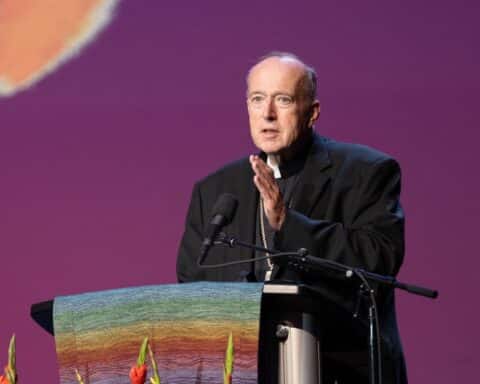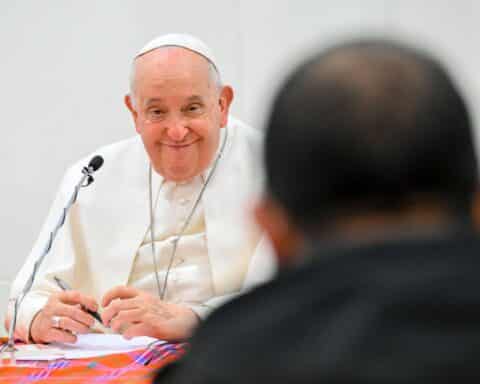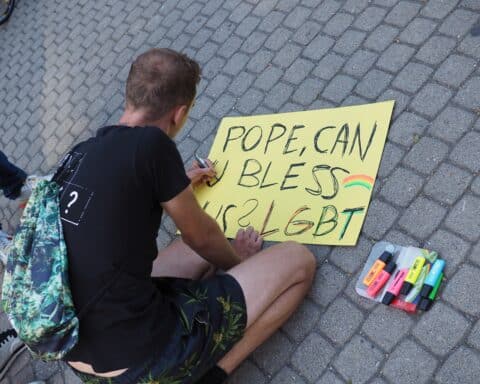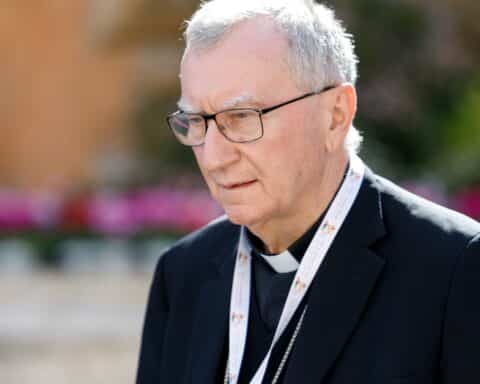(OSV News) — “These people will fix you. Come back when you’re healed,” a trusted priest told Simon Kent Fung, handing him a note with contact information for therapists. The priest knew Fung wanted to enter the seminary and Fung had just confided that he was attracted to men.
Fung describes the treatment he received as conversion therapy, a controversial practice designed to change his sexual orientation. The experience, he said, was disorienting and ultimately harmful, and could have prompted him to leave the Catholic Church.
Fung explores the impact of conversion therapy in a recently launched podcast, “Dear Alana,” which focuses on the story of Alana Chen, who died by suicide in 2019 at age 24 in Boulder, Colorado. Her family attributes her death to conversion therapy and related spiritual guidance, which she sought as a teenager and young adult after confiding to a priest at age 14 that she was attracted to women. Tenderfoot TV released the limited series podcast’s first episode Aug. 14 and it quickly rose to No. 1 on Apple Podcasts.
Fung, 39, created and narrates the podcast, and over eight episodes he shares his own story alongside Chen’s. The podcast’s critical look at Catholic culture around homosexuality isn’t intended to harm the Church, he told OSV News, but rather “to invite the Church to take a deeper look at what’s happening in its own family.”
“Making this podcast has been coming from a place of deep love for the Church, for this part of me that is so important to me,” said Fung, a practicing Catholic. “It’s really inviting the Church family to really look at some of its most vulnerable members, and to really speak up for those who’ve been hurt and harmed by the family. I really want to make it clear that that is my goal here, and it’s not to tear down or turn people away.”
Digging deeper into Chen’s story
In 2019, Fung followed Chen’s story on the news and recognized parallels to his own experience. He reached out in support to Chen’s mother, Joyce Calvo, and they became friends. Fung felt compelled to dig deeper into Chen’s story, which culminated in the podcast.
The podcast includes interviews with Calvo, and Chen’s sisters and friends, and excerpts from her 20 journals. They paint a portrait of a devout Catholic in love with Jesus hoping to become a religious sister. She was also deeply ashamed about having romantic feelings for other girls. She went to daily Mass and weekly confession, and she received spiritual direction from Father David Nix, who was assigned for a year to St. Thomas Aquinas Catholic Center and its associated parish in Boulder, which serves the University of Colorado.
Chen wrote in her journals that Father Nix told her to keep her same-sex attraction a secret from her parents. Chen went to UC Boulder for college and continued with spiritual direction under Father Nix, and sought counsel from St. Thomas’ chaplain, Father Peter Mussett, who in 2006 succeeded Father Nix. Chen also pursued professional counseling with the goal of eradicating her same-sex attraction. She journaled about feeling of shame, inadequacy and self-hatred when the same-sex attraction did not subside.
Chen began to self-harm, carving the word “defiled” in her arm, and in 2016 she was admitted to a psychiatric hospital after expressing suicidal thoughts. After seeking help at two mental health residential treatment centers, she left counseling and distanced herself from the Church. She wrote that she felt misled and abandoned by the church leaders she once trusted.
In August 2019, The Denver Post interviewed Chen for a story about conversion therapy, after the state passed a ban on conversion therapy for minors.
“I think the Church’s counsel is what led me to be hospitalized,” Chen told The Denver Post. “I was feeling so much shame that I was comforted by the thought of hurting myself. I’ve now basically completely lost my faith. I don’t know what I believe about God, but I think if there is a God, he doesn’t need me talking to him anymore.”
After Chen’s suicide, St. Thomas Aquinas Catholic Center released a statement that expressed sadness over Chen’s death and said, “We do not practice conversion therapy, and reject any other practices that are manipulative, forced, coercive, or pseudo-scientific.”
Archdiocese of Denver weighs in
In a statement shared with OSV News Aug. 31, the Archdiocese of Denver repeated that message, saying, “Commenting on specifics regarding Alana Chen is improper, but as the Archdiocese of Denver has previously stated, conversion therapy was never practiced. Trying to explain Alana’s story with a simplistic explanation is unfair to her memory. We reject any practices that are manipulative, coercive, or pseudoscientific. Alana, and every person, is beloved by God and deserves to be treated with mercy, dignity, and reverence. We continue to pray with and for everyone who is affected by Alana’s untimely death.”
The archdiocese shared an accompanying statement from St. Thomas Aquinas Catholic Center, which said, “Our deepest prayers and condolences continue for the Chen family, who experienced the tragic loss of their daughter, Alana. The St. Thomas Aquinas Catholic Center does not practice conversion therapy and remains against any form of coercion or manipulation. As Catholics, we reverence the dignity and free will of each and every human person and view every person’s life as a beautiful gift from God. We strive to live and preach the Gospel of Jesus Christ and embrace the teachings of the Catholic Church.”
Father Nix, who is now a diocesan hermit, posted on his blog “Pilgrim Priest” that he disputes Chen’s account of abandonment. He said that at Calvo’s request to the archdiocese, he was prohibited from contacting Chen in 2017 onward. He wrote, “So, I obeyed this, and this was a bad decision,” and then reiterated his previous claim about Chen saying, “The closer Alana was to the Catholic Church, the happier she was.”
Conversion therapy today
Conversion therapy practices are generally not supported by mainstream medical and mental health organizations, and at least 25 states have full or partial bans on the practice.
A 2020 report by the Williams Institute at UCLA School of Law finds that people who identify as gay or bisexual and experienced conversion therapy were almost twice as likely to consider or attempt suicide when compared to peers. According to the study, 7% of “LGB adults” aged 18-59 have experienced conversion therapy, with 81% of them receiving it from a religious leader and 31% receiving it from a health care professional.
Some national proponents of conversion therapy, also known as reparative therapy, have included Catholic psychologists — notably Joseph Nicolosi, a founder and former president National Association for Research and Therapy of Homosexuality, now the Alliance for Therapeutic Choice and Scientific Integrity. NARTH was the organization Fung was referred to by his priest.
In its 2006 document on pastoral care for people with same-sex attraction, the U.S. Conference of Catholic Bishops was ambiguous on conversion therapy, stating, “A considerable number of people who experience same-sex attraction experience it as an inclination that they did not choose. Many of these speak of their homosexual attractions as an unwanted burden. This raises the question of whether or not a homosexual inclination can be changed with the help of some kind of therapeutic intervention.”
The document said that there was no consensus on the “cause of the homosexual inclination.” It stated, “There is no consensus on therapy. Some have found therapy helpful.” The document advises Catholics who experience homosexual tendencies and wish to pursue therapy to seek “the guidance of a confessor and spiritual director who will support their quest to live a chaste life.”
Catholics share experiences
Eve Tushnet, author of the 2014 memoir “Gay and Catholic,” explored same-sex attracted Catholics’ experience of conversion therapy for a 2021 story in America magazine. She told OSV News the Church should not dismiss the experiences of Catholics who say the therapy hurt them, nor should it dismiss the shame experienced by many Catholics with same-sex attraction.
Tushnet served as a consultant on the making of “Dear Alana,” and said she found the podcast to be “really, really thoughtful,” adding, that “it genuinely adds to the conversation.”
Tushnet’s work focuses on ways same-sex attracted Catholics can be comfortable with their sexuality and live in harmony with Church teachings. She said the desire or pressure to change a homosexual orientation can feel stronger for Catholics who feel called to priesthood or a religious vocation.
“There are places which will not take you unless you can say that you’re straight, and that provides a huge motivation, because this future that you’re really longing for … is only going to be open to you if you can kind of get yourself ‘fixed,'” she said.
When they feel the therapy hasn’t worked, they are often disillusioned, she said. “Some of them still end up as practicing, orthodox Catholics. Some of them end up as practicing Catholics who are not that orthodox. And some of them leave the faith completely.”
Part of the challenge is the Church does not clearly present a positive vision for what life as a same-sex attracted Catholic can look like, Tushnet said. When same-sex attracted teenagers first come out to adults, they’re ultimately asking questions about what life will hold for them, Tushnet said.
“They’re not only asking questions about sex,” she said. “Sex is really complicated and hard for anybody who’s trying to live as a Catholic. Every straight person basically has desires that they cannot live out as a Catholic, things they would have to take to confession. But they do have models of what a future would look like for them that would be faithful and obedient. And right now, gay teenagers essentially don’t have that.”
Growing in holiness
One of the largest Catholic ministries in the United States for same-sex attracted Catholics is Courage International, which is inspired by Alcohol Anonymous’ 12-step model. “Dear Alana,” mentions the ministry, and Fung said that in addition to her therapy and spiritual direction, Chen attended Courage meetings.
Courage’s leaders say the organization does not promote conversion therapy. Accounts vary as to what extent Courage founder Father John Harvey, who died in 2010, was interested in reparative therapy or allowed the idea to influence Courage. “Dear Alana,” includes an audio snippet of him stating “reparative therapy is a good thing” and speaking positively about the work of British research psychologist Elizabeth Moberly, whose theories advanced conversion therapy. Father Harvey has written that reparative therapy wasn’t part of Courage’s approach.
Father Colin Blatchford, associate director of Courage International, said that some of its members have sought conversion therapies on their own. He said Courage focuses on growing in holiness, not on changing one’s sexual orientation.
While Church teaching condemns homosexual acts, it doesn’t condemn homosexual inclinations, he said. He is cautious, however, of dismissing as “conversion therapy” any therapy or spiritual guidance Catholic men and women seek to help end sexual addiction or to live chastely.
Same-sex attracted people should be treated with compassion, which isn’t the “they’ll fix you” response Fung received, Father Blatchford said.
“Compassion meets the person where they are and says, ‘I love you. God has a plan for you. Tell me your story.’ And then, ‘OK, let’s go on this (journey) together.’ That’s the essence of what Courage does,” he said. “We don’t tell people they have to go and get some sort of conversion therapy or change their orientation. I don’t care about what their orientation is. I care if they’re holy, and I would say that’s the truth of the Church.”
Finding community
Fung told OSV News that Catholics with same-sex attraction often experience a “triple-level” of shame: first, about their orientation, second from being told in conversion therapy that their “brokenness” comes from relationship wounds with parents, and third from frustration about not being able to change, which can lead to anger at the Church and God.
He recommends Catholics who experience same-sex attraction seek out Eden Invitation, an organization made up of “disciples with LGBTQ+ experiences” who aim to live in congruence with Jesus Christ and the Catholic Church. Fung also suggests Catholics approach same-sex attraction and same-sex attracted Catholics with curiosity and humility.
“Oftentimes in the Church, we really prize certainty and clear-cut boxes and rules, because we really prize the grasping of truth and God’s will in our lives,” Fung said. “I think we need to be really careful about how we walk with people, and this position of humility shows us the way.”





